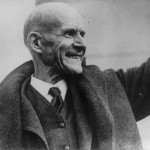Born in 1855 to French immigrant parents, Eugene Victor Debs was a lifelong resident of Terre Haute. Having dropped out of school at an early age, Debs first worked on the railroad as a fireman. The bonds that he forged with his fellow workers shaped his lifelong philosophy, expressed in one of Debs’ famous court speeches — “While there is a lower class, I am in it. While there is a criminal element, I am of it. While there is a soul in prison, I am not free.”
Debs began to organize on behalf of the working class and by 1893, his efforts had resulted in the American Railroad Union, the first industrial union in the U.S. Though the railroad union obtained concessions from the Great Northern Railway after an 18-day strike in April 1894, the Pullman boycott and strike the following month resulted in intervention by the National Guard, the break-up of the fledgling union, and Debs’ imprisonment.
Following his release, Debs pursued his goal of empowering the masses as an early organizer of the Industrial Workers of the World and a five-time presidential candidate on the Social Democratic and Socialist tickets. Anti-war remarks Debs made during a 1918 speech in Ohio violated the Sedition Act and landed Debs in jail again, where he staged his final presidential campaign though he had been stripped of his citizenship.
After assuming office, his opponent Warren G. Harding, commuted Debs’ sentence. The Sedition Act and the Espionage Act were subsequently declared unconstitutional, and repealed. Debs citizenship was finally restored in 1976, fifty years after his death.
For more information:






















